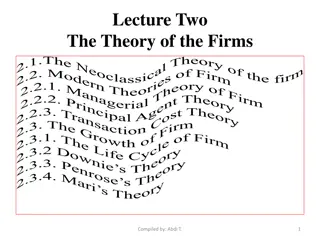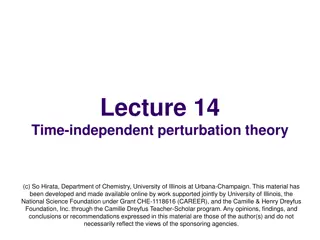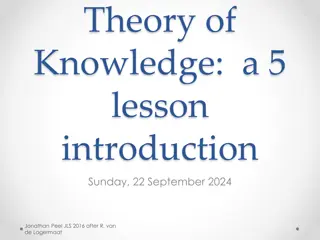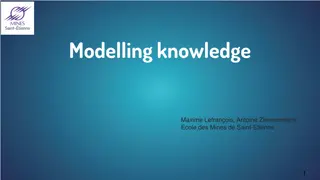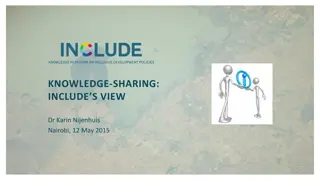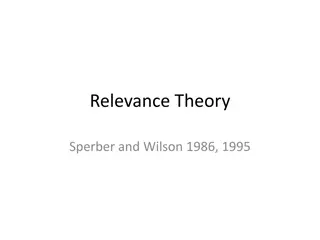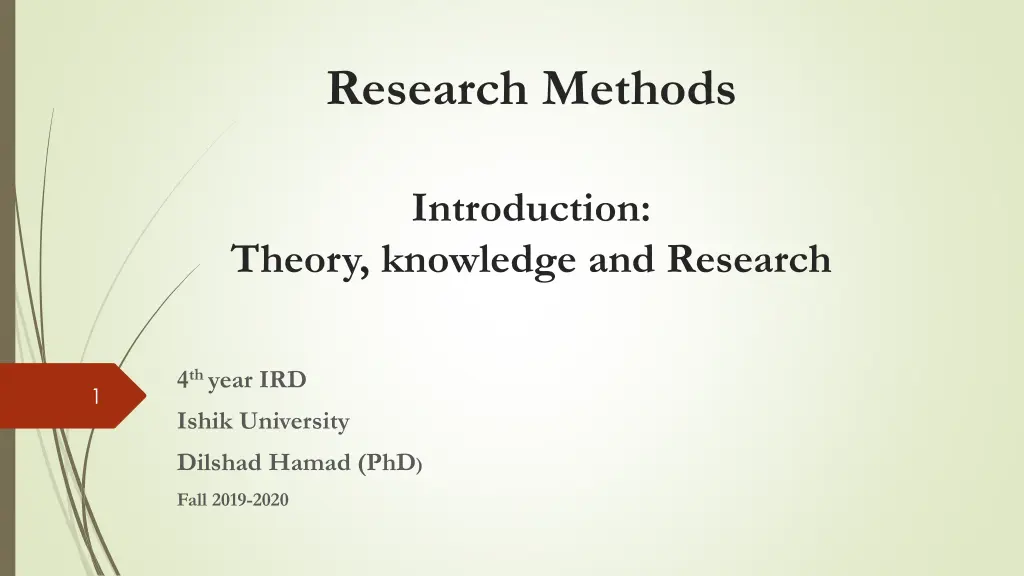
Understanding Research Methods and Knowledge in Social Sciences
Explore the fundamentals of research methods, ontology, epistemology, and social phenomena in social sciences. Learn about different ways of gaining knowledge and the importance of reflecting on personal experiences in academic research.
Download Presentation

Please find below an Image/Link to download the presentation.
The content on the website is provided AS IS for your information and personal use only. It may not be sold, licensed, or shared on other websites without obtaining consent from the author. If you encounter any issues during the download, it is possible that the publisher has removed the file from their server.
You are allowed to download the files provided on this website for personal or commercial use, subject to the condition that they are used lawfully. All files are the property of their respective owners.
The content on the website is provided AS IS for your information and personal use only. It may not be sold, licensed, or shared on other websites without obtaining consent from the author.
E N D
Presentation Transcript
Research Methods Introduction: Theory, knowledge and Research 4th year IRD Ishik University Dilshad Hamad (PhD) 1 Fall 2019-2020
We do research to improve our knowledge on the social world 2 Social World The setting or cultural surroundings in which social research takes place. Knowledge (1) information about or awareness of something, an issue, a fact; (2) an understanding of a matter, a fact, an issue.
Ontology & Epistemology 3 Ontology The science or study of being ; in social research, ontology refers to the way the social world is seen to be and what can be assumed about the nature and reality of the social phenomena that make Epistemology The theory of knowledge and how we know things.
Natural sciences vs. social sciences 4 natural sciences social sciences we study the natural/physical world which is separate from us , we study something which we are part of it social world
Social phenomena 5 social phenomenon Anything that influences or is influenced by human beings who interact with and are responsive to each other.
knowledge 6 (1) information about or awareness of something, an issue, a fact; (2) an understanding of a matter, a fact, an issue.
Five ways of knowing 8 1. I belief the number of cars should be reduced to save the environment Not may need to challenge our believes 2. Authoritative knowledge Religious, political or social authorities make sources of our knowledge We may ask the authority of such sources 3. experiential knowledge We gain knowledge through our daily and life experience As social researchers we may need to reflect on the knowledge and skills we have gained from our experience and how this influences what we are interested in and what we do. Belief
Ways of knowing 9 4. theoretical knowledge Our knowledge may partly come from theories we accept them As social researchers we can begin to identify the theories we use in everyday life and the theories that are used by others studying the same aspects of the social world. 5. Empirical knowledge Based on available research evidence or hypothesis that can be tested As social researchers we need to develop the skills to enable us to gather data to answer research questions or test hypotheses, to develop knowledge-based theories.
Three approaches to Truth (Blaikie, 1993: 6) 10 all knowledge of the world, but particularly of the social world, is relative in time and space; there are no absolute truths. all knowledge of these worlds is tentative; reality can not be observed directly but through concepts and theories there are truths to be known about the way the natural and social worlds work. The truth can be observed
Main ontological perspectives 12 Objectivism An ontological position which asserts that the social phenomena that make up our social world have an existence of their own, apart from and independent of the social actors (humans) who are involved.
An ontological position which asserts that the social phenomena making up our social world are only real in the sense that they are constructed ideas which are continually being reviewed and reworked by those involved in them through social interaction and reflection. Constructivism 13
Realism 14 An ontological position which asserts that the social world has a reality that is separate from the social actors involved in it, that can be known through the senses as well as the effects of hidden structures and mechanisms.
Main epistemological perspectives 15 Epistemology An epistemology is a theory of knowledge; it presents a view and a justification for what can be regarded as knowledge what can be known and what criteria such knowledge must satisfy in order to be called knowledge rather than beliefs (Blaikie, 1993: 6 7).
Positivism 16 An epistemological position which asserts that knowledge of a social phenomenon is based on what can be observed and recorded rather than subjective understandings. Augustus Comte (1798 1857) proposed that the social world can be studied using the same approaches as the natural world, in particular that there are general discernible laws about the way the social world works which do not vary.
Main feature of positivism 17 Knowledge is defined as that which can be observed by the senses. Knowledge of the social phenomenon is based on what can be observed and recorded rather than subjective understandings. Usually data are gathered to test a hypothesis which has been generated from existing theory. The researcher is independent of and has no impact on the data the researcher is objective.
A positivist study will include 18 quantitative data are collected; aspects of the social world, social phenomena, are measured; causal relationships between different aspects of the social world are sought; large data sets and statistical analysis are often used.
Hypothesis 19 A proposal or statement that is intended to explain observations or facts; it can be thought of as an informed guess about the social world that, if true, would explain the phenomenon being researched.
Interpretivism 20 Main features Knowledge gathered includes people s interpretations and understandings. The main focus is on how people interpret the social world and social phenomena, enabling different perspectives to be explored. The researcher is interpreting other people s interpretations in terms of the theories and concepts of the social researcher s discipline studying the social phenomenon as if through the eyes of the people being researched. The researcher works with the data gathered to generate theory. An epistemological position that prioritizes people s subjective interpretations and understandings of social phenomena and their own actions.
Interpretivist study will include 21 qualitative (rich in detail and description) data is collected; uncovering and working with subjective meanings; interpretation of meaning within a specific context; empathetic understanding, standing in the other s shoes .
Realism 23 Critical Realism Realism prioritizes identifying structures or mechanisms that result in inequality or injustice and thus offers the opportunity for social change by changing or negating the structural mechanisms that are identified as having these impacts. An epistemological approach that asserts that knowledge of a social phenomenon is based on both what can be observed and recorded and hidden structures and mechanisms whose effects can be observed.
Main features of Critical Realist approach 24 revealing hidden structures and mechanisms; uncovering power relations and dominant ideologies; research that leads to action; collecting qualitative and/or quantitative data.
What is social research is about? 25 Social researchers try to: (a) to describe and explore a social phenomenon (or social phenomena); (b) and, usually, to understand and explain how and why the phenomenon is or is understood as it is. Social research is about exploring, describing, understanding, explaining, predicting, changing or evaluating some aspect of the social world . . . what , why and how questions. (Blaikie, 1993: 4)
Four types of research 26 Descriptive research Who are the young men who are involved in gun crime? Exploratory research What is it like to be a member of a gang? Explanatory research Why do young men join gangs that participate in gun-related crime? Evaluation research What changes in policy and practice would best help young men not to join such gangs?
Research concepts 27 Variable Causal relationship An attribute or characteristic of cases (for example, individuals, organisations, objects or situations) which can vary from case to case. The assertion that a change in A causes a change in B .
Theory & Concepts 28 Theory Concepts An abstract idea which encapsulates a way of describing or thinking about a social phenomenon, for example, family, poverty, power, health. (See A4 for more about working with concepts.) A set of ideas or related concepts which can be used to explain and understand an event, situation, social phenomena.
Types of theories 29 macro theories meso theories micro theories Theories that attempt to cover all aspects of the social world in general terms (also known as grand theories). Middle-level theories relating to social phenomena usually found, such as organisations, institutions, Local theory relating to a specific area, group of people or aspect of the social world.
Paradigms 30 (1) The entire constellation of beliefs, values, techniques and so on shared by members of a given (scientific) community (Kuhn, 1970: 175). (2) A cluster of beliefs and dictates which for scientists in a particular discipline influence what should be studied, how research should be done, how results should be interpreted and so on (Bryman, 1988: 4).
Paradigms as maps 31 directing us to the problems that are important to address, the theories that are acceptable, and the procedures needed to solve the problems (Marlow, 2001: 7).
Theoretical framework 32 The ideas and approaches to viewing and gathering knowledge, and which provide the basic ways of addressing a topic.
Using theories in social research 33 Using existing theories of your own and of others Using theories of social research and knowledge Working with theory Developing research questions or hypotheses Explaining your data




